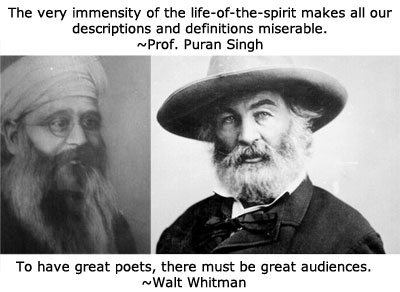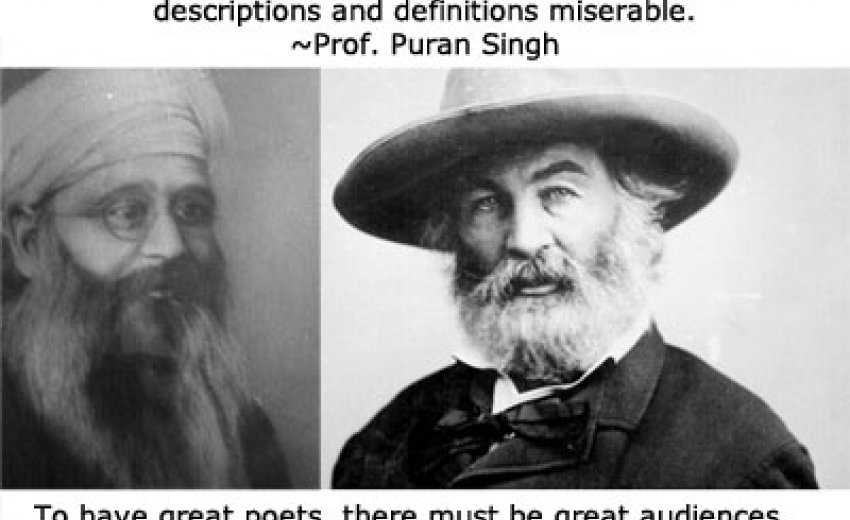Puran Singh: A Whitman Re-Incarnated In Punjab
Puran Singh's thought was shaped by four climactic events in life, and these were his Japanese experience, his encounter with Whitman, his discipleship of Swami Ram Tiratha, and his meeting with Bhai Vir Singh. Puran Singh was introduced to Walt Whitman during his studentship in Japan in 1901 through an American Professor teaching at Tokyo University. He read his 'Leaves of Grass' and was so much infatuated with Whitman's verse that it became the condition of his poetic and craft.

Whitman-Puran Singh identity is so complete as to almost suggest the idea of poetic reincarnation. It is not so much mental similarity as the psychic unity of the soul-consciousness underlying the Sikh compositions and Leaves of Grass. Whitman and Puran Singh had a similar Philosophy of Poetry. Both regarded the poet as a person possessed in whom the utterance became the message in the very act of creation. It will be helpful to trace briefly the story of their affinities by drawing parallels from their life and works.
Inspiration
Whitman admitted in 1860 to Trowbridge that he could never have written his poems if he had not first come to himself by reading Emerson in 1854. "I was simmering, simmering, simmering, Emerson brought me to boil."
Puran Singh was influenced by Walt Whitman's Leaves of Grass but the real inspiration came after his meeting with Bhai Vir Singh during the Sikh Educational Conference held at Sialkot in 1912. He records this event in his own words:
"aus suBwg GVI gurU jI dy dr qy iek mhWpurK dy dIdwr hoey, Ar Awp dy ikRpw ktwKX nwl pMjwbI sihq dw swrw boD qy iKAwl dI aufwrI AweI[ kivqw vI imlI qy ausI imhr dI nzr ivc, ausI im`Ty swD bcn ivc mYnUM pMjwbI bolI Awp muhwrI AweI"[
Idea of the Poet
Whitman felt that the personality of the poet and the poem he creates cannot be separated. All the beauty of poem, he wrote, comes from beautiful blood and beautiful brain. In a long paragraph of the Preface he tells what the embryonic poet should do: love nature and stand for the common people, re-examine all you have been taught in the school, church or books, and dismiss whatever insults your soul; then your very flesh shall be a great poem and have the richest fluency not only in its words but in the silent lines of its lips and face and between the lashes of your eyes and in every notion and joint of your body. While common people can see the physical appearance of things, it is the poet who shows them the underlying spiritual meaning. Whitman even gives the poet a Christ-like healing power. The poet will replace the priest because of his realization of man's divinity.
Puran Singh writes in a similar vein (Spirit of Oriental Poetry): Our idea of the poet is that of a man who can, by the mere opening of his own eyes, enable others to see the Divine; whose one glance can be our whole knowledge. Whatsoever weighs down the inner self and seeks to imprison it in illusion is foreign to the spirit of poetry. It is irreligious. True poetry must free us. He is the poet who converses with the beings of light from the inner realms of soul-the self and here on earth represents God more than man. Any below this level of inspiration of rapture and prophetic vision is poetic, but not the poet. The poetic among us are the highest men who, in higher altitudes, touch the footprints of the sacred poets that come down to us as inspired beings from on high.
Poet and Scientist
Whitman also establishes the relationship between the poet and the scientist5: the scientist is the father and the law-giver of poets. The poets are born of the father stuff of the scientists, who develop the souls of the poet, their vision of reality of life and universe. The poets must do more than mention the achievements of science, they have to fuse science into poetry. Whitman feels that scientist's construction underlies the structure of every perfect poem. Wordsworth has defined poetry as the impassioned expression which is the countenance of all science. Puran Singh fully realized the truth of it in his own life. For him poetry and science were not two opposite poles of reality as is often believed. He saw the inner identity which eludes the critical eye.
Puran Singh worked as scientist, to earn his livelihood, throughout his life. He got specialized training in Pharmaceutical Chemistry from Tokyo University (1900-1903) and served as a research chemist at F.R.I., Dehradun for over a decade. He published 53 research papers and memoirs on the basis of his research investigations. Purn Singh was a member of Royal Chemical Society, London and Chemical Society of Japan.
There is no apparent contradiction between Puran Singh's scientific self and literary self. He was a distinguished chemist of his times as well as a creative genius in literature. The following examples illustrate the imprint of his scientific career on his literary writings:
| (i) | I am for the physics of the soul which is the physics of the beauty of the body too. I love the myriad forms divine. (Spirit of the Sikh, Music of the Soul, p.117) |
| (ii) | the very radium of mind has been slowly allowed to degenerate into sinking lead. |
| (iii) | Impertinent desires dim his faith and bend it beyond the limits of elasticity." |
| (iv) | We, too, if we rise not to our full moral stature, shall soon become fossils, not Sikhs. |
| (v) | As the chemist talks of pure elements occurring in nature, the Guru refers to pure people of cosmic spirit. |
Poets of Free Verse
Whitman and Puran Singh both rebelled against the gagger and gilt of the metre-making argument as Emerson said. Style for Whitman, as Norman Forester rightly says, is not dress of thought but a shaping from within; is not mechanical but organic. Whitman even uses the mirror image to suggest the relationship between poetry and life. The organic relation between form and subject-matter should not be marred by superimposing conventional ornaments. The form of poems should develop like the plants and trees.
Since Puran Singh's infatuation with Whitman's verse becomes the condition of his poetics and craft, all his poetry is written in verse libre. He is the first Punjabi poet who introduced this style in Punjabi poetry. The titles of his collections also reflect this character viz. "Khule Ghund, Khule Lekh, Khule Asmani Rang and Khule Maidan."
Ideas about Democracy
Puran Singh and Walt Whitman differ in their ideas on Democratic state. Puran Singh is a follower of Carlyle and a preacher of Khalsa ideal of Guru Gobind Singh in his writings whereas Whitman defends democracy in Democratic Vistas first published in 'The Galaxy' in December 1867 and May, 1868 in two components as Democracy and Personalism, respectively. Democracy is an answer to Carlyle's scathing attack on democracy in Shooting Niagara; published in England in August, 1867. While recognizing the shortcomings of American democratic state, Whitman was idealistic and writing more of the future of democracy than of its achievements to date:
"Far, far, indeed, stretch, in distance, our Vistas. Whitman's basic argument in Democratic Vistas is that a democratic literature is needed to provide the people with archetypal models of character and behaviour for educating people for genuinely democratic society of the future. Whitman's poet creates models for the instruction of common people, each one of whom is as good as a prince. The existence of democracy depends upon the improvement of the character and personality of the common people, and the poet has to help in it. The unlimited growth of the individual and the equality of such infinite individuals are the two principles on which the successful working of future democracy depends".
Puran Singh is emphatic in his criticism of democracy of mere votes and elections. "Great men are true representatives of the people. So they have been in all ages, for true greatness is always representative. But the giants are gone and now the tiny dwarfs flutter and shake their wings. They have not the soul in them to take any responsibility. They have misunderstood democracy. By the introduction of the idea of democracy into politics, perhaps, that tall, Himalayan kind of human personality has been made impossible. All have become sand grains in one great level desert. The winds blow and the heaps of sand are gathered here and there and then are blown away. Such is the fate of human affairs in this age-a significant fate. All ideals are in the melting pot and from the great liquid will crystallize the New Ideals. Then the world tired of these dwarfs will cry for its old Himalayan giants again. Down with Democracy will they cry as they once cried Down with Kingship".
Again, he seems to contradict Mahatma Gandhi: "There is no such thing as Swa-raj, self-government: we are always governed best by a noble man, not by ourselves if we are not so noble. The rest are mere words, votes, democracy".
However, Whitman and Puran Singh both stress the role of comradeship in making the democracy a success. Comradeship counterbalances the materialistic side of democracy and spiritualizes it, without it, democracy will be incomplete, in vain, and incapable of perpetuating itself. Puran Singh writes in a similar strain: "The bread affairs engross all political activity of man, and the true progress of man is to make it so simple as the provision of sunlight by the sun. The state needs to be organized on the rich love of man to man. Work makes us spiritual. The selfishness of man cannot be got rid of by small men like Lenin and Trotsky".
Puran Singh preaches Khalsa ideal of spiritual democracy in the world. True democracy lives in the shadow of the soul consciousness of Guru Nanak. Man needs to be truly and inwardly a divine aristocrat to be truly democratic in this world. In the constitution of the Khalsa commonwealth, the greatest act of genius of Guru Gobind Singh was when he transferred the divine sovereignty vested in him to the God-inspired people, the Khalsa.
Democracy, the dream of modern civilisation was established in this part of Asia in the exact modern sense in the realization of the spirit of Man. And the mortal fallacies which poison the human thought among the Soviets were avoided by the Khalsa. The Khalsa made democracy its daily practice, driven by the inner feeling that is reborn of the spirit of the Guru, that all men are brothers. Democracy is not conceived as a social system, but as a true inner spirit-born feeling. Democracy is the moral feeling that naturally wells up in the Informed ones.
The humblest brick-lifter has equal rights of joy and life with the king. A labourer who feels richer than a king and a king who feels poorer than a labourer- this is democracy of the spirit. Their self, their I, was realilsed as the Guru's self in every Sikh. The glorious Guru Gobind Singh called this commonwealth the Khalsa, his son, and laid the infant in the lap of the Mother-Mata Sahib Devan. Physical birth became by this act of love a negligible accident. And the Khalsa stood bound by its moral rebirth as one individual, one person, the Son of Guru Gobind Singh.
The alternations of the outer condition of life, even political revolutions cannot secure the equal distribution of land and wealth and labour; they cannot transmute human nature. Unless the change be wrought within, the volcanoes will burst forth again, and the lava shall flow as before, and all our leveling of conditions will be in vain. The Guru visualized this and leaving the outer surfaces of human nature untouched, changed the inner springs of action.
Whitman and Khalsa Ideal
Puran Singh identifies the Khalsa ideal of Guru Gobind Singh in the writings of Walt Whitman. This identity is so complete that he called him "A Guru Sikh born in America to preach the Guru's ideal to the modern mind. Puran Singh further elaborates: "Walt Whitman is one of the Western apostles of the Guru's spirit. Many more will rise and the Guru Granth shall be sung by Humanity gathered in great Guru's heart. The modern world is in ferment. The Guru's Ideal of the Khalsa is pregnant with that fount of power of the Deep Repose (Sahej) which the modern world is seeking (Spirit of the Sikh, Part II, Vol.1, P.60).
Parallels in Poetry of Whitman and Puran Singh
It is remarkable that both the great poets adopt not only the same style but also the same form and content for their muse. Both sing of common people, ordinary things and God in the world of men and matter. Both are singers of glory of their native lands. While Whitman is more athletic and sensuous in his songs, Purn Singh is more feminine and puritan in love. Both sing the praise of senses: "Our senses are not hallucinated, but they need a still greater amplification and quickening to see the spontaneous working of the cosmic person". (Spirit of the Sikh, p. 142).
When I see the oxen eating and eating straw, I look at them for long, since this act of gluttony, when they have such large bodies, is the highest spiritual act, compared with the non-eating of the huge boulder. Senses and their excitements and pleasures too, of animals, including the human animal, are, from this viewpoint, highly interesting spiritual acts". (Spirit Born People, p. 112).
(i)
I celebrate Myself
And what I assume you shall assume
For every atom belonging to me as good belongs to you.
(Walt Whitman, Song of Myself)
sohixAW! mu`l pw qUM Awpxw[
v`D qoN v`D hor hwlIN bhuM swrw[
qyrw mu`l koeI nWh, qUM kImqW QIN pry,
E XUsPW dy XUsPw[
(Puran Singh: mu`l pw qUM Awpxw)
(ii)
Loafe with me on the grass
Loose the stop from your throat
Not words, not music or rhyme I want
Not custom or lecture-only the lull I like.
(Walt Whitman)
pSUAW dw cu`p cupIqy, cugxw qy rjxw qy n`sxw
dyK dyK muV muV locW
mYN muV muV pSU QIx nUM[
AwdmI bx bx Q`ikAw[
(Puran Singh: pSU crdy)
(iii)
And that all the men ever born are also
My brothers and the women my sisters and lovers.
(Walt Whitman)
Aw sux vIrw rWiJAw, Aw BYxy hIry[
AsIN qusW ibn s`Kxy[
(Puran Singh: hIr qy rWJw)
Whitman's Idea of Self
Whitman believed that there is a distinction between one's mere personality and the deeper self (or between ego and soul). He believed that Self is of the same essence as the Universal spirit, as Indian philosophers do in the phrase 'Atman is Brahman'. He believed that true knowledge is to be acquired not through the senses or the intellect, but through union with the self. At such moments of union (merger) the gum is washed from one's eyes, and one can read an infinite lesson in common things, discovering that a mouse, for example, is miracle enough to stagger sextillions of infidels. This true knowledge is available to every man and woman, since each conceals a divine self. Moreover, divinity of all implies the perfect equality of all, the immortality of all, and the Universal duty of loving one another.
Influence of Indian Philosophy
Whitman has no occasion to read Bhagwat Gita and Upanishads but his ideas find their roots in Indian philosophy or Buddhist Mahayana system. However, he was not sublime like Indian Philosopher (rishis). Remaining for a long time in the dangerous phase of self-inflation (or dilation) and regarding himself as a God-inspired prophet, he kept looking about for other new doctrines to prophecy. American nationalism, unashamed sex, Wander Speaker and singer of self were some of the outlets he found for his prophetic vision. Whitman had originally been writing about a 'not-myself' a representative figure who, by achieving union with his trans-personal soul, had realized the possibilities latent in every man and woman.
Identical Twins
The twin-ship image of Whitman and Puran Singh is reinforced by their striking physical resemblance. Each was in his own way a compellingly handsome man with the face washed in radiant glow. Whitman and Puran Singh had a similar philosophy of poetry. Both regarded the poet as the person possessed in whom the utterance became the message in the very act of creation.
Both in Whitman and Puran Singh, the imagery of eruption, plunge, sweep and flight is pervasive. Whitman shows fondness for the word "Electric" and we see in his poetry not only illuminations but charges and sparks also. Puran Singh is also inebriated by sheer sparkle, dazzle and dapple of things and objects in the world. Both reject pain, suffering, tragedy and evil. Puran Singh's worldview is rooted in Gurbani, and as such, all suffering is sublimated, subsumed and transcended. Both reject cold philosophy, metaphysical wilderness, systematization and Brahmanical logic chopping in their poetry.
End Note: This Essay is from My Book: "Puran Singh: Scientist, Poet and Philosopher" published by Tarlochan Publishers, Chandigarh (2008).
Hardev Singh Virk
Visiting Professor, SGGS World University,
Fatehgarh Sahib-140 406, India
-----------------------------------------------
Related Article:





